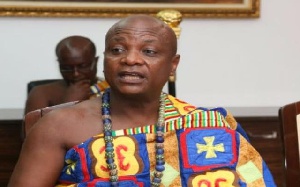Successful entrepreneur and Chairman of the World Trade Centre Accra, Togbe Afedi XIV, has charged African leaders to get rid of corruption if they want their countries to develop and ensure the prosperity of every citizen.
Speaking in an exclusive interview with the B&FT about what is holding the African continent back in terms of development, Togbe Afede XIV expressed worry about the age-old canker of corruption – saying it is the bane of the continent.
“The biggest impediment to Africa’s development is corruption. When you talk about the selfishness, the unwillingness to collaborate, and losing control of our economies, all come from corruption.
“Corruption is the bane of African development, so if we are to work together; if we are to maintain good fiscal policies; if we are to minimise budget deficits; if we are to minimise debt to GDP ratio and other things, we have to stamp out corruption because it is the cause of many imbalances. Our debt to GDP ratio will benefit a lot if we stamp out corruption, because most of the money we borrow finds its way into the pockets of certain people,” he said.
Togbe Afede urged African leaders to collaborate and stamp out corruption if integration of the continent is to be successfully achieved.
“So, fundamental to our success; fundamental to making the most out of integration; fundamental to ensuring our peace – all starts with stamping out corruption. Corruption hurts the success of various countries, so it is important that if Africa is to develop a more serious, a more concerted effort must be made to deal with corruption,” he said.
Togbe Afede XIV’s comment is underscored by President Mahammadou Buhari of Nigeria, who said at the launch of this year’s African Union theme in January, which is ‘Winning the Fight Against Corruption: A Sustainable Path to Africa’s Transformation’, that corruption is the number-one evil on the continent.
“Corruption is indeed one of the greatest evils of our time. Corruption rewards those who do not play by the rules and also creates a system of distortion and diversion, thereby destroying all efforts at constructive, just and fair governance.
“In effect, corruption deprives our young citizens of opportunities to develop meaningful livelihoods. We must therefore work together to defeat this evil,” President Buhari said.
He further urged all African countries to strengthen institutions set up to check and fight corruption.
“In this connection, I cannot overemphasize the value of strong institutions. A Judiciary that stands firm against arbitrariness and injustice by the executive is a vital pillar in the anti-corruption fight. As leaders, we must build synergy between the Executive, Legislative and Judicial arms of government in order to entrench good governance, transparency and accountability.
“We must adequately empower our national anti-corruption agencies and insulate them from political influence. We have to encourage increased institutional collaboration between Law Enforcement Agencies and anti-corruption Agencies in order to win this fight,” he said.
According to Transparency International, an anti-corruption institution, Africa places first among the worst-performing regions in terms of corruption.
It noted, however, that some countries on the continent are making strides in the fight against corruption, owing to political will.
“In fact, some African countries score better than some countries in the Organisation for Economic Cooperation and Development (OECD).
“The key ingredient that the top-performing African countries have in common is political leadership that is consistently committed to anti-corruption. While the majority of countries already have anti-corruption laws and institutions in place, these leading countries go an extra step to ensure implementation,” the report noted.
The anti-corruption institution further called on the AU to call for “visible commitment to anti-corruption from all of its leaders”.
Business News of Friday, 8 June 2018
Source: thebftonline.com

















